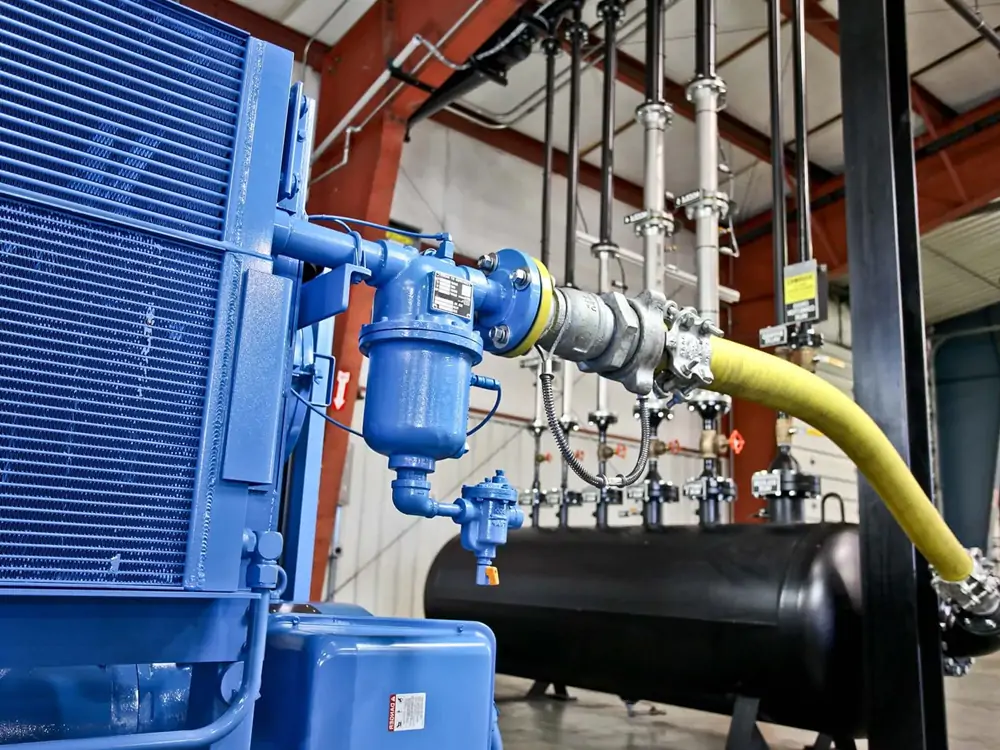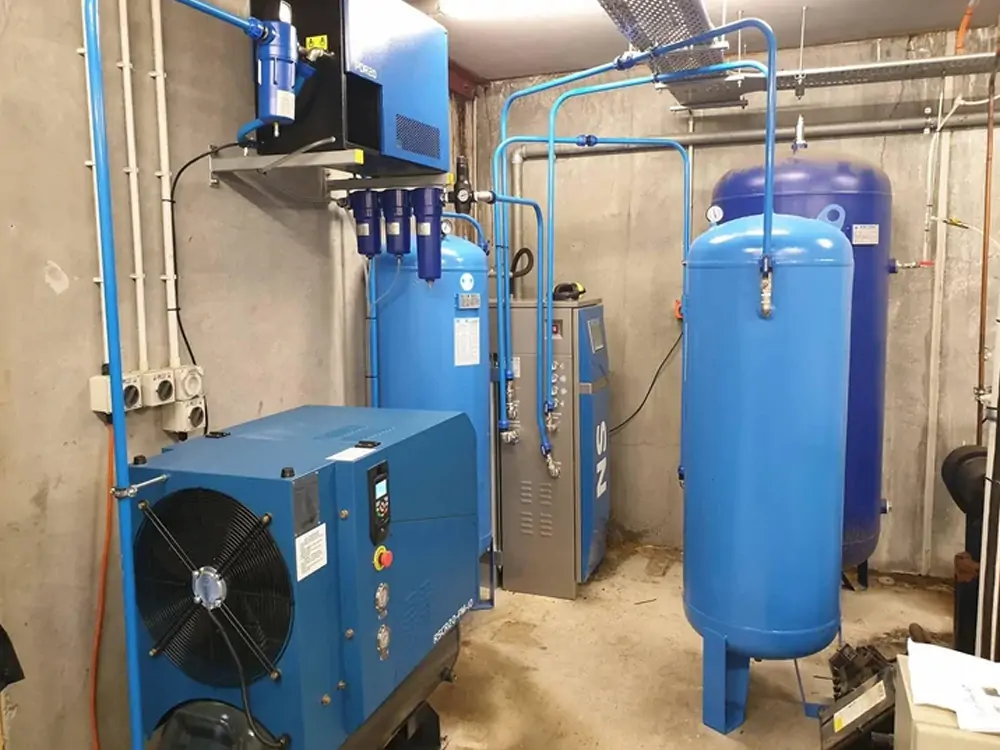When discussing industrial manufacturing or other applications requiring compressed air, air quality is an often overlooked but crucial element. We often focus on ensuring our compressed air systems provide enough pressure to drive equipment. But we rarely consider the humidity and purity of the air. This is where compressed air dryers become essential.
This article explores why compressed air dryers are indispensable equipment in many situations. We’ll look at when you might need a compressed air dryer. Whether you are an industrial manufacturer or use compressed air daily, this article will help you better understand why you should consider investing in a quality compressed air dryer. Let’s explore how this seemingly small but important device can have a profound impact on a variety of applications.
Where Does The Water in Compressed Air Come From?
L'humidité de l'air comprimé provient principalement de l'atmosphère. Ceci est inhérent à l'air naturel. Peu importe la saison, the atmosphere has a certain relative humidity. En outre, après compression ou refroidissement, the water vapor in the air will become liquid. Cela affecte la qualité de l'air comprimé.
In industrial air compressor applications, many users are very sensitive to moisture. Since we can’t eliminate the water before the air compressor, it must remove moisture in the compressed air treatment system.
Avant d'entrer dans le compresseur d'air, l'humidité de l'air est principalement de la vapeur d'eau. Et c'est insaturé. Comme indiqué dans la feuille 1, l'humidité relative de l'air est 69%, et la température est de 20°C. Après compression (7 bar), la vapeur d'eau dans l'air comprimé devient saturée en raison du refroidissement du refroidisseur arrière du compresseur d'air. Et 42% d'eau liquide sera précipité. A gas-water separator and storage tank can remove this liquid water. Le reste 58% of water is in the compressed air as water vapor.
S'il n'y a pas de sécheur à compresseur d'air, the direct use of compressed air will be bad for production. Donc, refrigerated and desiccant air dryers have become the preferred air treatment equipment.
Il existe trois exigences générales pour la teneur en eau de l'air comprimé.
① The air compressor discharges compressed air. S'il y a une glacière + récepteur d'air, then it can lower the temperature by 3 pour 10 ℃. This can meet customers with low-quality air, tels que les appareils de forage, canons à air, etc..
② But most industrial enterprises generally have such requirement :10℃>point de rosée sous pression>0℃. This requires using an air compressor refrigerated dryer to remove the water vapor.
③ If the need for dew point ≤ 0 ℃, choosing a desiccant air compressor air dryer is necessary. The common dew point requirements for adsorption compressed air dryers are -20℃, 40℃, and 70℃.
What Are The Specific Problems That Arise?
Le compresseur d'air décharge l'air comprimé, mais c'est pas propre. There are many contaminants, comme l'humidité, particules de poussière, huile, etc.. They will enter the production process if they are not purified and dry. De plus, de nombreux compresseurs d'air à vis sont de type huile. This leads to many problems.
Production Capacity Decline
If there is no air dryer compressed air, humidité, and oil will clog and rust pneumatic equipment and tools. Cela provoque un fonctionnement lent. Outre, les lignes et les pièces obstruées entraîneront une baisse de pression. Et les outils perdront en efficacité. In a long time, l'équipement tombera en panne. Dans les cas graves, cela peut entraîner des arrêts de production.
Increase Product Defect Rate
Une teneur élevée en eau dans l'air comprimé entraîne une augmentation du taux de défaillance du produit. Par exemple, spray painting and electronic product processing. Dans les machines de découpe laser ou plasma, l'humidité polluera les lentilles de nos têtes de coupe. Donc, it will directly affect the cutting efficiency.
En outre, various influence exists in the food industry. L'air comprimé joue souvent un rôle dans l'emballage et le transport des aliments. Aussi, l'air comprimé entre souvent en contact avec le produit.
S'il n'y a pas de sécheur d'air de compresseur d'air, then much moisture or oil can damage our food. Surtout dans l'industrie des aliments secs, il y a des exigences plus strictes pour l'humidité de l'air. Les normes ISO ont différentes classes pour la qualité de l'air comprimé dans l'industrie alimentaire. Different levels have different contents of solids, eau, et de l'huile.
Air Aerodynamic Loss
L'eau dans l'air comprimé corrodera les tuyaux. Cela conduit à l'obstruction des tuyaux. De plus, mixing water, huile, and dust can exacerbate blockages. Outre, dans les régions froides, le gel de l'humidité peut faire geler les tuyaux. Ensuite, la pression chute et la différence de pression est grande. Finalement, it will affect the safety of production. En outre, it will lead to air leakage from the pipeline in serious cases.
Il a donc besoin du sécheur d'air comprimé réfrigéré et du sécheur de compresseur d'air déshydratant pour éliminer l'eau.
Increase Production And Maintenance Costs
L'humidité et l'huile endommagent directement nos composants pneumatiques. Outre, they will also corrode our equipment. Ensuite, nous devons remplacer les pièces de rechange par des neuves. Cela augmente à la fois le coût de maintenance et le coût du temps de production.
To improve compressed air quality, you must install precision filters to remove oil and water. Alors, install an air compressor air dryer to remove the water deeply. Cela amène le point de rosée à atteindre les exigences de l'application.

What Can Compressed Air Dryers Bring You
A compressor air dryer is a device used to process compressed air. It improves compressed air quality by removing moisture and other impurities from the air. Below are some of the main functions the air compressor dryer can perform.
Dehumidification
Compressed air often contains significant amounts of moisture, harming many applications. Compressed air dryers remove moisture from the air through technologies such as cooling, adsorption, or membrane separation. This prevents moisture from corroding, icing, or other problems with equipment and processes.
Purify
The air may contain particulate matter, grease, bacteria, et autres impuretés. These impurities can cause problems in some sensitive applications. Air dryer compressed air can filter these impurities and provide cleaner and purer compressed air.
Improve System Efficiency
Dehumidification and purification of compressed air can improve the efficiency of compressors and pneumatic equipment. Dry air transports energy more efficiently, reduces corrosion on pipes and equipment, and reduces maintenance costs.
Extend Equipment Life
Compressed air dryers can extend the life of compressors, valves, and other critical components by reducing damage to equipment from moisture and impurities, downtime, and repair costs.
Ensure Product Quality
In some manufacturing processes, compressed air is used to carry raw materials or participate directly in the manufacture of products. If the air contains moisture or contaminants, this may adversely affect product quality. Air dryer compressed air ensures that products are free from contamination and meet quality standards.
When Do You Need A Compressed Air Dryer
There are many situations where you might need an air compressor dryer. It depends on your application and environment. Below are some common situations.
Pneumatic Equipment
If you work with pneumatic tools, control systems, or machinery, dry compressed air is essential to their proper operation. Moisture can cause stuck valves, leaky cylinders, or tool failure.
Precision Manufacturing
In precision manufacturing, such as electronics, semiconductor, or optical manufacturing, tiny water droplets or particles in the air can cause damage to products. The air compressor dryer ensures the required air quality during production.
Food And Pharmaceutical Industry
In food and pharmaceutical production, hygiene standards are very strict. Moisture and contaminants can pose a threat to product safety and quality. Dry compressed air helps avoid these problems.
Cooling And Freezing Applications
In cooling and freezing systems, dehumidified compressed air helps prevent freezing and frost and maintains stable system operation.
Painting And Coating
If you use compressed air in automotive painting, woodworking, or other coating applications, humidité, and oils can adversely affect the quality of the coating. A compressed air dryer ensures uniform coating and good quality.
Gas Production
Certain gas production processes require extremely high-purity gases, and dehumidification and purification of compressed air are key steps in producing high-purity gases.
Avoid Pipeline Corrosion
Moisture and contaminants can trigger corrosion in pipes and vessels. This may cause leakage or damage to the equipment. Compressor air dryers protect equipment and infrastructure from such hazards.
Économie d'énergie
Dehumidified compressed air requires less energy to transport. Drying air, therefore, reduces energy costs and increases system efficiency.

Conclusion
Dans cet article, we dig into the importance of air compressor dryers and when to consider using them. Whether it is industrial manufacturing, precision manufacturing, food processing, pneumatic equipment, or other applications, compressed air quality is one of the key factors in ensuring system efficiency and product quality.
A compressed air dryer can be a seemingly small and easily overlooked device. But it is critical to many industries and applications. Ensuring your compressed air is of the right quality can increase productivity, reduce maintenance costs, and ensure product quality. Donc, whether you need a compressed air dryer depends on your needs. But considering them is often a smart choice that can provide lasting benefits to your workflow and business.
